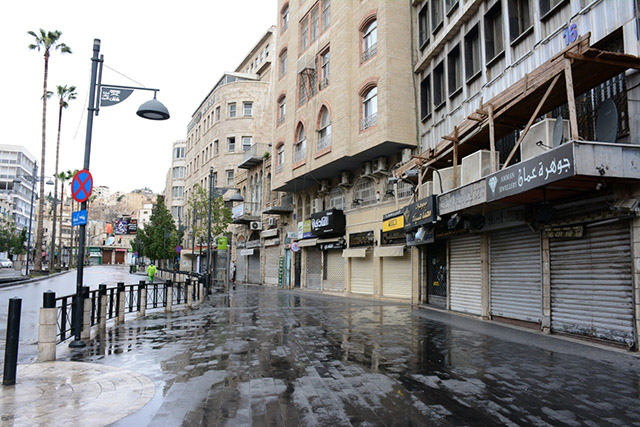AMMAN — Women’s groups on Saturday said that hotline services are operating normally in the Kingdom as sociologists and psychiatrists urged the public to get accustomed to the nationwide curfew that came into effect on Saturday to curb the spread of the coronavirus.
Solidarity Is Global Institute (SIGI) Executive Director Asma Khader and Jordanian Women’s Union (JWU) Director General Nadia Shamroukh, whose organisations operate hotlines that serve domestic abuse cases, said they will continue offering tele-guidance services.
“In these circumstances, we believe that victims who are abused by individuals who are already abusers within the family or others who might act in a violent manner out of frustration from the current situation need our full support since it is hard for them to leave their abusive environments,” Khader said.
Khader told The Jordan Times that cases of domestic violence are expected to increase since “people are afraid of the unknown situation and believe that it is okay for them to continue abuse against one of their family members”.
That is why, Khader added, “we took a decision to continue receiving calls and follow up on any case that contacts us”.
Shamroukh added that the hotline at the JWU is open and that the union will coordinate with the authorities in the near future to help abused women and children to reach the shelter when needed.
“So far, we have not received any major case because people are preoccupied with the coronavirus, but we are preparing ourselves to start receiving cases in the near future,” Shamroukh told The Jordan Times.
Jordanian National Commission for Women (JNCW) Secretary General Salma Nims said the commission also offers a hotline and “after learning more about the circumstances of a case, we immediately refer it to the concerned entities”.
“Our hotline is working and depending on the case, we either refer them to other women’s entities that are experts in dealing with these cases or they can contact the Family Protection Department for help,” Nims told The Jordan Times.
Meanwhile, Mizan Law Group (MLG) Executive Director Eva Abu Halweh told The Jordan Times that the Family Protection Department (FPD) and other government entities affiliated with the Ministry of Social Development are “operating normally”, but with minimal staff.
“We reached out to the ministry and the FPD because we had a case and they said they are ready to receive cases,” Abu Halaweh said.
Head of the Juvenile and Community Security Directorate at the Social Development Ministry Mahmoud Hrout told The Jordan Times that all government facilities related to domestic violence are “operating as normal”.
“We are following all the required instructions by the government and when we receive cases from the Family Protection Department or other entities, they are placed in quarantine until we are sure they are safe to mix with other residents of our facilities,” Hrout said.
The hotline number for the JWU is 065675729. The hotlines for SIGI are: 0797699415, 0798372953 and 0797114598. The JNCW hotline is: 080022955.
Meanwhile, SADAQA Core Team Member Sahar Aloul said that, during these times of adversity, “we need to pay close attention to the least-protected and most-susceptible members of our society, particularly women who are in violent relationships, since cases of gender-based violence are known to increase in times of turmoil since they go unreported, unnoticed and behind closed doors”.
“Today in circumstances like the lockdown and the curfew, victims of violence, including those exposed to domestic violence — mainly women and children — are being locked up with their abusers 24/7, and this will ultimately lead to a rise in domestic violence cases,” Aloul told The Jordan Times.
Specialist in psychiatry and addiction Maen Abki said that many Jordanians are bearing strain from previous factors such as the current economic situation and political conflicts, which contribute to stress in homes.
“Before the curfew was imposed, women had other means of escaping aggression and violence at home by going back to their families or resorting to hotlines. But this is not the case today,” Abki said.
Sociologist Hussein Khozahei urged people to “stay calm, be patient and practiselove and compassion within the family”.
“There will be some friction between family members at home and in order for people to be able to cope with these exceptional conditions locally and internationally, everyone needs to show patience, more love and support and work on being united more than ever,” Khozahei told The Jordan Times.
“People should not feel that they are hostages in their own homes. Instead, they need to take advantage of staying together for a long period to get to know more about each other and support each other,” he said.
Khozahei, who is a professor of sociology, encouraged people to resort to old hobbies that they may have stopped practising such as painting, reading, playing music instruments, or trying to learn a new language.
